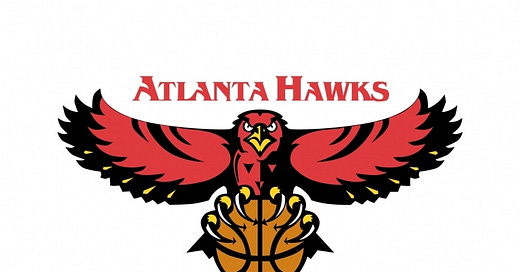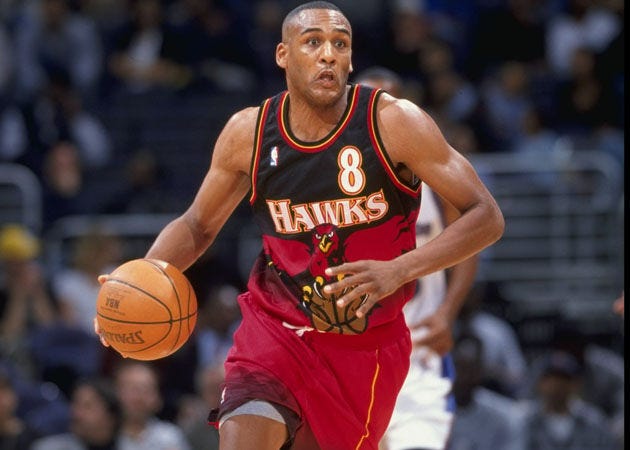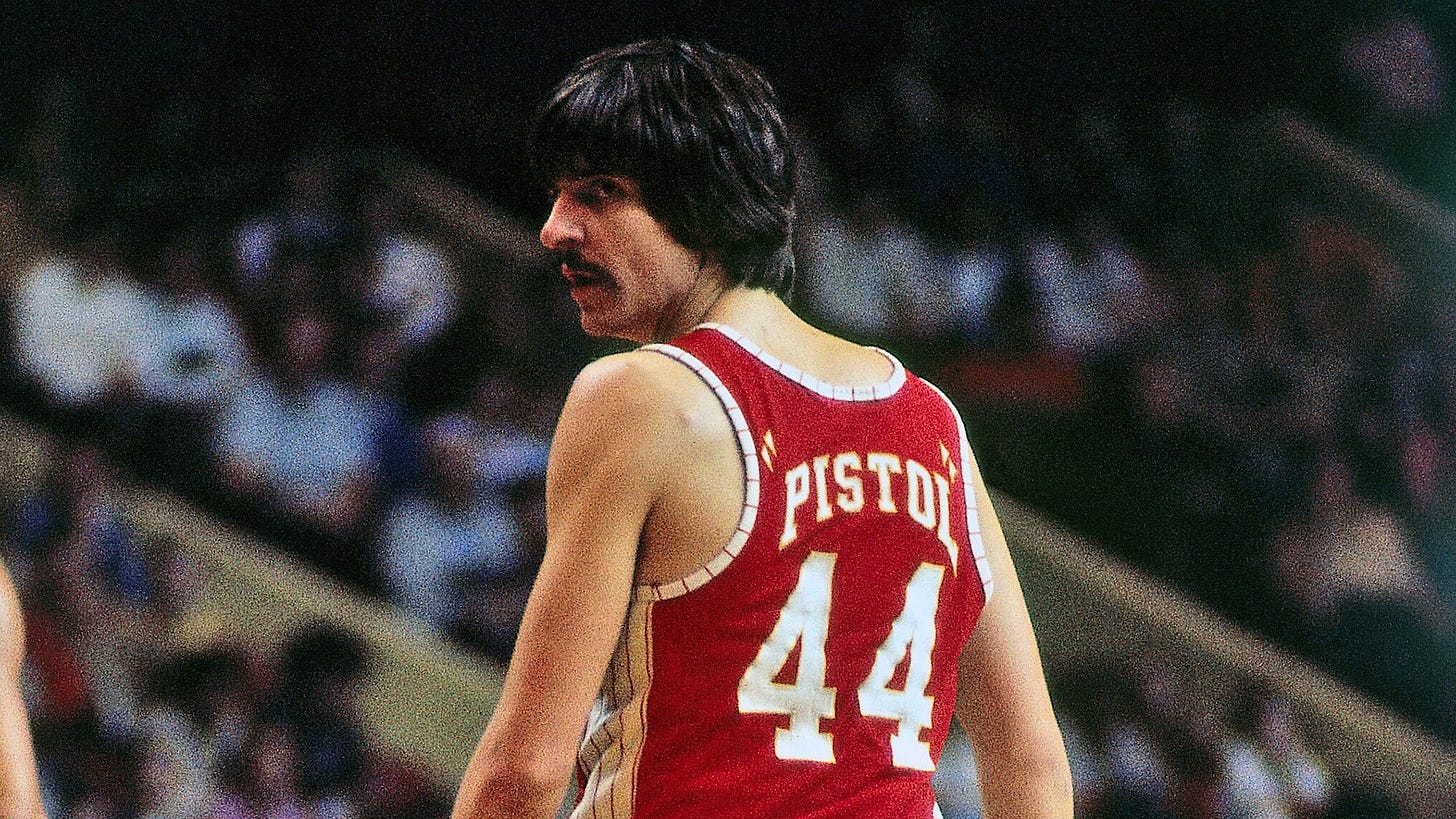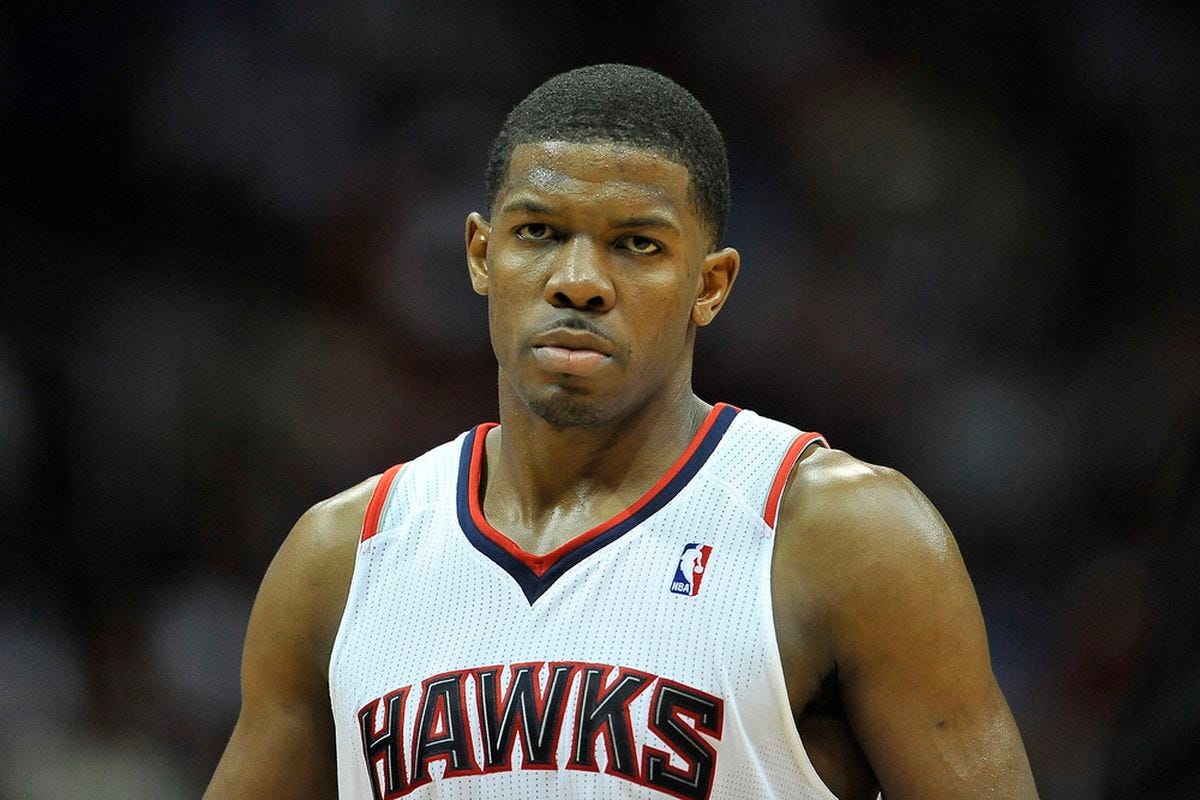Top 5 Shooting Guards In Atlanta Hawks History
Lou Hudson tops the list of greatest Atlanta Hawks shooting guards
In the Atlanta Hawks’ 74 years in the league, they’ve had a lot of decent shooting guards. Some notable shooting guards who played with the Hawks include Jamal Crawford, Stacey Augmon, and Joe Caldwell.
Kyle Korver
It’s pretty certain the Hawks brought the best out of Kyle Korver.
Before throwing on that Hawks jersey, he played for the Philadelphia 76ers, Utah Jazz, and Chicago Bulls. On Jul. 16, 2012, the Bulls traded Korver to the Hawks in exchange for cash considerations.
As soon as Korver joined the Hawks, he took off.
In the 2012-13 season (his first one), he averaged 10 points while shooting 46 percent from the field, 45 percent from the arc and 85 percent from the free throw line.
In the final 73 games, he made at least one 3-pointer, the longest active streak in the NBA and a career-best for him. The streak also marked the fourth longest in NBA history; Dana Barros made a 3-pointer in 89 straight games, Michael Adams with 79 games, and Dennis Scott with 78. Korver’s 189 3-pointers in the season was the fourth-best single season total in Hawks history.
To no surprise, Korver finished the season ranked second in the league in 3-point percentage and fourth in 3-pointers made.
On Jul. 12, 2013, the Hawks granted him a four-year, $24 million contract.
Korver continued to stay focused on his great shooting as he averaged 12 points in the 2013-14 season. On Dec. 6, 2013, he passed Barros for most consecutive games with a made 3-pointer with 90 games (Barros had 89). However, the streak ended on Mar. 5, 2014 at 127 games, which is still remarkable.
He finished that season ranked first in the NBA in 3-point percentage with 47 percent.
The 2014-15 season was Korver’s best season of his career. Due to Dwyane Wade’s hamstring injury, Korver made the only All-Star appearance in his career. It was also the last time he averaged double-figure points with the Hawks.
On Dec. 15, 2014, he hit four 3-pointers in a 93-86 victory against the Chicago Bulls. It also pushed him to No. 15 on the all-time 3-pointers made list, passing Jason Richardson.
Five days later, Korver had one of his best games of the season. On Dec. 20, 2014, he led all scorers with 22 points in a 104-97 victory against the Houston Rockets.
Korver continued his rise on the all-time 3-point ladder. On Mar. 11, 2015, he recorded five 3-pointers in a 115-102 loss to the Denver Nuggets. With that, he passed Kobe Bryant for 12th all-time in 3-pointers made.
A few days later, his run would slow down.
On Mar. 15, 2015, Korver took a hard offensive foul on Los Angeles Lakers’ power forward Ed Davis. But during the process, Korver ended up getting nose broken. The injury ended his streak of 51 straight games with a 3-pointer.
Equipped with face mask to protect his nose now, Korver picked up where he left off.
In a 105-95 loss to the Detroit Pistons on Mar. 31, 2015, he made four straight long-range shots which included three 3-pointers. He did all that in a 65-second span.
Even through all of that, Korver led the NBA in 3-point percentage a second straight time with 49 percent.
He had one of his worst years during the 2015-16 season. He had a few great games but his scoring wasn’t what fans were used to seeing.
On Nov. 6, 2015, he logged in 22 points and 100 percent shooting in a 121-115 victory against the New Orleans Pelicans. While doing that, he connected on all four of his 3-pointers.
With the one 3-pointer he recorded in a 117-98 victory against the New York Knicks on Dec. 26, 2015, he passed Rashard Lewis for No. 9 on the all-time 3-pointers made list.
Unfortuantely, he went through a slight shooting slump in December and January. He ended the season with an average of just nine points, the lowest since the 2011-12 season.
After playing just 32 games in the next season, he was traded to the Cleveland Cavaliers on Jan. 7, 2017.
Still, his efforts with the Hawks were amazing. He’s currently ranked No. 4 on the Hawks’ all-time 3-pointers made list with 818. Right now, he holds the assistant general manager position with the Hawks.
Steve Smith
In order to get Steve Smith in a Hawks uniform, one of the biggest trade heists in NBA history had to take place.
After playing just two games with the Miami Heat in the 1994-95 season, Smith and Grant Long, two of the Heat’s best players at the time, were traded to the Hawks in return for Kevin Willis.
In the 78 games Smith played that year with the Hawks, he averaged 16 points, helping the Hawks earn their third consecutive playoff spot. He averaged 19 points in the Eastern Conference first round against Reggie Miller and the Indiana Pacers but ended up getting swept 3-0.
The next year he showed what he could really do. Smith averaged a then career-high 18 points in the 1995-96 season and formed a lethal backcourt with point guard Mookie Blaylock, who averaged 15 points.
The Hawks made the playoffs again and got as far as the Eastern Conference semifinals. This is when Smith had one of his greatest playoff games.
In Game 4 of the Semifinals against the Orlando Magic, he led all scorers with 35 points which included seven 3-pointers, giving the Hawks a 104-99 victory. However, the Hawks lost Game 5 and lost the series 4-1. In those playoffs, though, Smith averaged 21 points.
The 1996-97 season proved to be Smith’s best one. He averaged a career-high 20 points while being the Hawks’ main option on offense.
On Mar. 14, 1997, he scored 36 points in a 97-91 loss to the Seattle Supersonics. What made the performance great was he made a career-high nine 3-pointers.
It wasn’t too long when Smith followed it up with huge defensive effort.
On Apr. 9, 1997, he recorded a career-high five steals in a 116-101 victory against the Philadelphia 76ers.
The next season would be a replicate for Smith as he still averaged 20 points. The only difference was he increased his shooting percentage from 42 to 44. He played so great that he was named to the All-Star Game, which was his only appearance throughout his career.
Unfortuantely, his tenure with the Hawks came to an end. Before the 1999-00 season, Smith was traded to the Portland Trail Blazers in a four-player trade.
Smith is currently the Hawks’ seventh all-time leader in 3-pointers made with 549.
Pete Maravich
What’s a Hawks’ shooting guard list without “Pistol Pete” himself.
Before stepping foot into the NBA, the world knew about Pete Maravich and his skill set. When he played for Louisiana State University, he became one of the greatest college basketball players of all-time.
To this day, he holds the NCAA all-time scoring record with 3,667 points.
When he was drafted as the third overall pick in the 1970 NBA draft, people questioned Maravich on different levels. Some wondered if he was a good fit since he had to share the backcourt with Lou Hudson, one of the league’s best scorers. Others, including many veteran players on the Hawks, resented the $1.9 million contract he got.
Without a question, Maravich proved his naysayers wrong.
He spent his first four years in the NBA with the Hawks, in which he became one of the greatest offensive talents ever, coupled with his playmaking skills. He was known for his ball handling skills and ability to connect on behind the back passes.
In his rookie year (1970-71), he averaged 23 points per game and was named to the NBA All-Rookie First Team. When the playoffs came around, he stayed consistent. In the 1971 Eastern Conference first round series against the New York Knicks, he averaged 22 points.
Ultimately, the Hawks lost the series in five games.
His scoring took a bit of a dip in the next year. He averaged 19 points in the 1971-72 season but it took a leap in the playoffs. He logged in 27 points per game against the Boston Celtics in the Eastern Conference first round but the Hawks lost in six games.
The 1972-73 season marked the first of many high-scoring seasons for him.
He averaged 26 points (fifth in the NBA) and six assists (sixth in the NBA). But that’s not what stood out.
During the season, Maravich scored a total of 2,063 points while Hudson had 2,029 points. They became the second set of teammates in NBA history to each score over 2,000 points in a single season. The first were Los Angeles Lakers’ greats Elgin Baylor and Jerry West in the 1964-65 season.
Maravich’s contributions were acknowledged when the earned his first of two consecutive All-Star appearances with the Hawks and named to the All-NBA Second Team.
In his last year with the Hawks, he had the best season statisically. During the 1973-74 season, he averaged 27 points, the most since joining the team. The average placed him behind Bob McAdoo for No. 2 on the season’s scoring list.
After the season, Maravich was traded to the New Orleans Jazz, who were an expansion franchise.
Maravich’s legacy with the Hawks was nothing short of tremendous. It was where he continued to grow as a lethal scorer and player, who eventually made it into the Basketball Hall of Fame. He also earned the privilege of having his jersey retired.
Joe Johnson
Of course, “Iso Joe” had to be on this list.
Some may not want to admit it but Joe Johnson’s impact on the franchise was incredible. After a few disagreements with the Phoenix Suns, he joined the Hawks via a sign-and-trade deal involving Boris Diaw and two future first-round draft picks.
His first season in Atlanta was nothing short of spectacular.
During the 2005-06 season, he led the Hawks in a few major statistics. He guided them in points per game with 20, assists per game with six, steals per game with one and minutes per game with 40. He even led them in 3-pointers made with 128.
Those numbers made Johnson one of only five players in the NBA to average at least 20 points and six assists, joining Allen Iverson, Dwyane Wade, LeBron James and Gilbert Arenas. He was also the only Hawk to play all 82 games that season.
It wasn’t until February and March when Johnson started putting on career performances.
He recorded his first career triple-double on Feb. 1, 2006 in a 102-92 victory against the Charlotte Bobcats. He finished with 15 points, 10 rebounds, and 11 assists.
On Mar. 7, 2006, he scored a career-high 42 points in a 113-106 victory against the Golden State Warriors. He followed that up with a great playmaking performance on Mar. 13, 2006. He recorded a career-high 17 assists in a 88-87 loss to the Milwaukee Bucks.
It’s safe to say the 2005-06 season was the groundbreaker for his time in Atlanta.
Johnson never took his foot off the pedal. As a matter of fact, he pressed it a little harder heading into the next year.
During the 2006-07 season, he ranked 11th in the NBA with a 25 point per game average while shooting a career-high 47 percent. He was so good he replaced injured Jason Kidd in the 2007 All-Star Game, marking his first of six straight All-Star appearances with the Hawks.
In the following year, NBA pundits started recognizing Johnson’s talents. In 2008, he won the Eastern Conference Player of the Month award in March. During that month, he averaged 24 points and seven assists.
He also led the Hawks to their first playoff appearance in nine years, an appearance in which he had his best playoff game. In Game 4 of the first round against the Boston Celtics, he scored 35 points with 20 of them coming in the fourth quarter.
Despite his huge scoring display, they lost to the Celtics in seven games.
The next two seasons were sort of the same. Johnson, to no surprise, averaged 21 points in both.
In the 2008-09 season, Johnson logged in 11 30-point games and one 40-point game. On Dec. 23, 2008, he recorded his second career triple-double in a 99-88 victory against the Oklahoma City Thunder. He had 20 points, 11 rebounds, and 11 assists.
The 2009-10 season would be the last time averaged over 20 points. After being sidelined two games due to an Achilles' tendinitis, he did have his biggest moment of the year.
On Mar. 19, 2010, he hit a game-winning buzzer beater to give the Hawks a 93-92 overtime victory against the Bobcats.
Once the 2009-10 season was complete, the Hawks made a move on Johnson. On Jul. 8, 2010, they re-signed him to a six-year, $123.7 million contract, making him the highest-paid player at the time.
After averaging 18 points the next two years, he was traded to the Brooklyn Nets. He currently ranks No. 6 on the Hawks’ all-time scoring list with 10,606 points, No. 7 on their assists list with 2,653 and No. 2 on their 3-pointers made list with 908 3-pointers.
Lou Hudson
Throughout his career, Lou Hudson was referred to as “Sweet Lou”, a name that he never shied away from. As a matter of fact, he made it a habit to embrace it by his style of play on the court.
Hudson had a great shooting touch which allowed him to shoot 48 percent from the field during his career.
But let’s back track to the beginning.
After a great college career, he was selected by the Hawks as the fourth overall pick in the 1966 draft. He didn’t waste any time making a name for himself.
In his very first season (1966-67), Hudson led the Hawks in scoring with an average of 18 points a game. The Hawks advanced to the 1967 Western Division Finals that year but lost 4-2 to the San Francisco Warriors. In the series, he averaged 20 points but he put on his best scoring display in the first round. He averaged 26 points against the Chicago Bulls, whom they swept 3-0.
He only played 46 games the next year due to military duty but he returned in a huge way.
During the 1968-69 season, Hudson made his first of six straight All-Star appearances. He averaged 21 points that season but the next season was arguably one of his best.
He averaged 25 points on 53 percent shooting in the 1969-70 season but his best game? That would take place in just the 13th game of the year.
On Nov. 10, 1969, he scored a career-high and franchise record 57 in a 133-132 victory against the Chicago Bulls.
The real test came during the 1972-73 season. Hudson averaged a career-high 27 points but had to share the backcourt with Maravich.
Hudson’s productivity would start to fade away later in his career while playing just limited minutes. In the 1974-75 season, he played just 11 games due to injuries, however still averaging 22 points.
On Sept. 30, 1977, he was traded to the Lakers for Ollie Johnson.
Hudson is still ranked No. 3 on the Hawks’ all-time scoring list with 16,049 points and you can find his jersey up in the rafters with the other greats.
Cory Nelson is a contributor to Sports Illustrated’s channel “Inside The Heat”. He attended Northern Virginia Community College. He can be reached at corymckenzienelson@hotmail.com or follow him on Twitter @CKenzyNelson and Instagram @ckenzynelson









